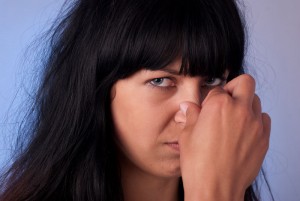My Chimney Smells! Should I Worry?
Normal Smell or Alarming Smell?
Anyone who has a fireplace and chimney in their home knows that some odor is unavoidable. Whenever there is something burning, there is going to be a faint smell of smoke. However, in some cases, an odor coming from the chimney is a sign of a bigger problem. In order to understand what that problem might be, it is important to get very specific in describing the odor in question. This will help you communicate clearly with the certified sweep you hire to inspect your chimney.
If the smell coming from the chimney is a musty odor, the problem is most likely an accumulation of water in the chimney. If this is the case, the problem could go far beyond the smell. Water damage in the chimney can weaken the foundation, causing it to crumble or flake. This damage could spread throughout the home, compromising the structural integrity of the entire house. In addition, it causes mold, which can lead to illness in as well as the unpleasant smell.
In some cases, the smell will be similar to burning asphalt or unappetizing barbeque. If this is what the smell is like, there is a good chance that there is too much creosote building up in the chimney. Creosote is a chemical compound left behind after treated wood or coal is burned in the fireplace. If it is not cleaned out regularly, it puts the home at risk for a dangerous house fire. In addition, anyone who comes into contact with the substance may find themselves with respiratory issues as well as skin irritation.
If the smell is one of rotting material, it is likely that there are leaves or other plant material rotting away inside of the chimney. When these elements are combined with the soot and ash left behind after a fire, the smell is intensified. Leaves often find their way into the chimney during a rainstorm and, like water, can cause problems beyond the smell. If they clog up the chimney, it will not ventilate properly and the home will fill with smoke.
In some instances, homeowners notice the smell of animal waste coming from their chimney. If that is what it smells like, it is most likely exactly the problem. There are many species of small rodents and birds that like to make their homes in chimneys. The result will be an array of animal waste left behind and, over time, the smell will start to make its way into the home.
There are many different things that can cause unpleasant smells coming from the chimney, but there are also ways to avoid the problem. One of the simplest is to install a chimney cap. This simple piece keeps animals, water and plant life from getting into the chimney. In addition, it is a good idea to have a professional chimney sweep come and maintain the chimney at least once a year. A thorough annual cleaning will help take care of dangerous issues that a chimney cap cannot help, such as the accumulation of creosote.
Many people love the smell of a crackling fire but few people like the other odors that often come from a chimney. Pinpointing exactly what the smell smells like is the best way to identify from where it is coming. Most chimney odor problems can be solved with a good cleaning and a chimney cap to keep out unwanted elements.


